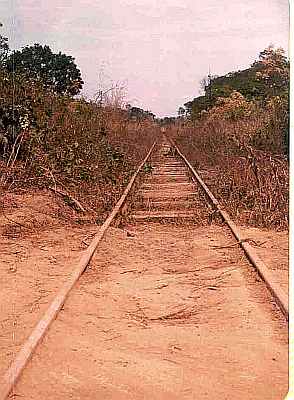Brazil - The Making of a Novel - Part 33
August 29-30 Left Porto Velho at 4.30 a.m. with Eduardo Borcacov for Guajará Mirim 335 dusty kilometers away. Argentinean-born Borcacov of Russian heritage converses on virtually any topic under the sun with worthwhile opinions. He knows environment intimately from many years in Rondônia's forests as lumberman. Trip took ten hours driving with two hours lingering at Madeira-Mamoré stations en route, now mostly ghost towns.
Vila Murtinho, for example, a dozen or so houses around a barely recognizable square. Column in middle of soccer field commemorates 1822/1922 (Independence,) abandoned stores, inhabitants hanging around doing nothing in particular. Along the road, no evidence of real agricultural development in ten years since it was opened, usual burnt patches, some grassed areas, few cattle, all adding to depression one feels at sight of abandoned tracks, equipment, stations etc.
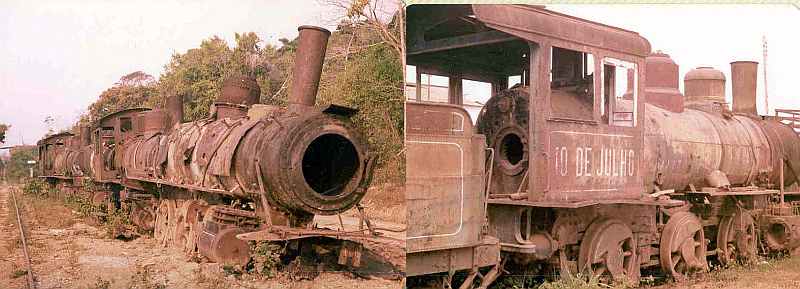 |
| Madeira-Mamoré railroad relics in 1980 |
Some wide-ranging Eduardo pointers/ observations/ images on past and present as we traveled: a) all railroad equipment imported, including standards from London b) dormitory for visiting dignitaries above station at Guajará-Mirim c) struggling agricultural community with church under construction for five years f) small country hospital, male patients of all ages in general ward g) stream with beautiful bathing spot, Indian maloca upstream x 14 hours travel h) blue butterfly worth at least $50 i) balls of latex covering square in front of old station j) forest landing strips k) 25,000 hectare fazenda.
Weekend with Eduardo along Madeira-Mamoré railroad, in every retrospect, a valued experience. I have begun to see Vicente Cardoso's (Cavalcanti) experience in a very different light for two reasons: A) Rondônia provides bases of “last frontier” (soon to pass with coming of statehood.) B) Madeira-Mamoré story needs more than an outsider's view. Vicente has to be physically involved with the construction and thereafter gradually to become a “man of power” in the territory. All points to having Vicente actually engage on the construction of the railroad and emphasis of rubber boom.
 |
| Gold Nugget found in Brazil 1980 |
Eduardo offered many leads to this in yarns like that of Maciel, the coronel/concessionaire who went batty after taking to Indian pagé's concoctions i.e. mushrooms of altered states variety. Rondônia is not “Amazonas” with all that name implies but all the ingredients are here, plus some of the unknown: a great river (Madeira); Indians of violent and pacific type: Caripunas and Novas Pacos; rubber boom; typical Trans-Amazonas type highway; pistoleiros and possesseiros; the old Wild west, to this day; great lumber enterprises; area south-west of Rondônia scene of gold rush today, dredging and panning rivers with some major finds of nuggets; significant immigration from the North-East, especially Ceará; Japanese farmers; migrants and adventurers from many lands, including descendants of the workers who came to build the Madeira-Mamoré; Shockness, Norman, the Asians, Lebanese. A microcosm of an earlier Brazil of the South and, in some respects, an unfortunate carry-over of problems of the North-East.
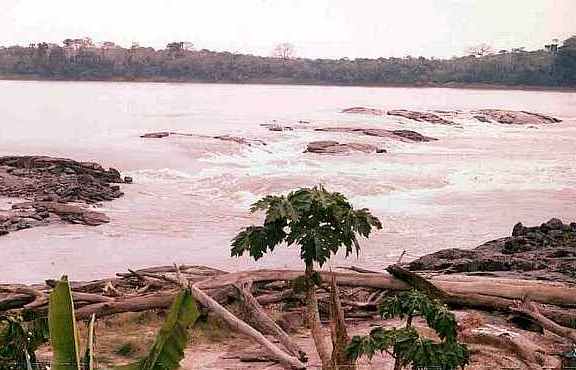 |
| Madeira-Mamore Rapids near Guajara Mirim |
Spent hours talking as we traveled back from Guajará-Mirim yesterday banging along cratered road with stops at "Restaurante e Borracharia" for food and to fix tires i.e. "borracharia!"
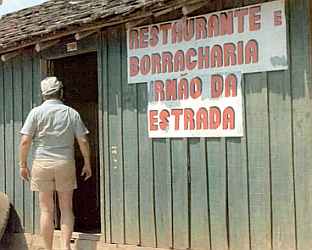 |
| Roadside Garage, 1980, Rondônia |
Some of Eduardo's points: The vast land extent of Brazil is totally deceptive for you have to fight the forest inch by inch, a battle that may never be “won,” possibly can never be won and, like so many confrontations leaves a trail of victims. In this case, some human but more the spoliation of nature as depicted in the charred hulks of forest giants fallen in grotesque ruin amid fields of ashes.
As the Indians showed centuries ago, so today: The soil thus “liberated” is able to produce a good first crop, the second is poor, the third a disaster necessitating a new clearing and leaving the forest to recover with a poor secondary growth.
On North/South dichotomy: the people of the North-East, and by extension the north “migrants” are sufferers, they are martyrs who love the land no matter how cruel it may be to them and their children. The people of the South see them as the meanest laborers for whom there is little home, a burden for booming Brazil.
Edward offers an anecdote sadly familiar: “Waldemar” migrates from the North-East to São Paulo where he becomes a bricklayer engaged in the construction of one of São Paulo's skyscrapers. When it's finished, he is not allowed to enter!
On prospects of revolution: Ed refers, as do most people, to three safeguards: futebol, carnaval, loteria. (Looking at TV antenna atop the remotest shacks, I would add “TV” as fourth safeguard.)
He notes, too, that you don't launch a revolution on hungry bellies. Ché Guevara tried that in Bolivia and look what happened. The real incentive comes from a reasonably well-fed middle-class with more time to think and plan; the peasant has less time to do anything but “survive.”
A power-clique of generals and moneyed aristocracy call the shots at the national level. Men might change, as with appointment of Figueiredo offering apparent new image, but driving force and ideas remain the same. Backing the clique are multinationals and foreign banks, who in the foreseeable future make a drastic change of status quo impossible. Brazil has once again traded its independence for colonialism, this time no gunboats and foreign princelings but “economics.”
With leadership of Brazil, important to comprehend the “man on the second floor.” The real power is often held by people other than those in the “boardrooms;” people who stay out of the public eye and quietly exert Power.
Foreign influence in Brazil was same, for example, with “Ypiranga,” Strangford, Collingwood, backing independence not for sake of Brazilians but to gain a favorable trade and economic foothold for British interests. England's economic colonizer role was taken over by America and now a new “partner” is on the horizon: Japan, going after the vast mineral and natural resources.
With an important difference, according to Ed: The Brits and Americans always looked down upon the Brazilians from highest level. Brazilians, because of the big Japanese community in their midst, have come to know and respect them as honest, hard-working; they trust the Japanese whereas long experience has led to wariness of the U.S. and the British.
Also effect, in a lesser way but no doubt important, of anti-U.S. propaganda over the years, with “Yankee Go Home” drummed into heads of South Americans. Conversely, though, average Brazilian has little love for Cuba which is seen as a “government mess.” Brazilians know what a sprawling bureaucratic muddle can result in through their own home-grown examples: They're not interested in importing something that could worsen the situation.
September 1 Flew from Porto Velho to Cuiabá, changed there and flew to Brasília and onto Rio de Janeiro. It's not merely the vast distance covered within one country but coming out of the bush, it strikes you dramatically: the difference between all the poverty and struggle you have seen in “greater Brazil” and the suited, suave, soft-leather shoed people here, all bound for Rio, which most people I've seen these past forty days will never set eyes on. The contrast is shocking. I have a picture of a quintessential Rio granddame, paunchy, loaded with jewels, transported to one of those “restaurantes e borracharias” alongside any sertão road I've traversed...
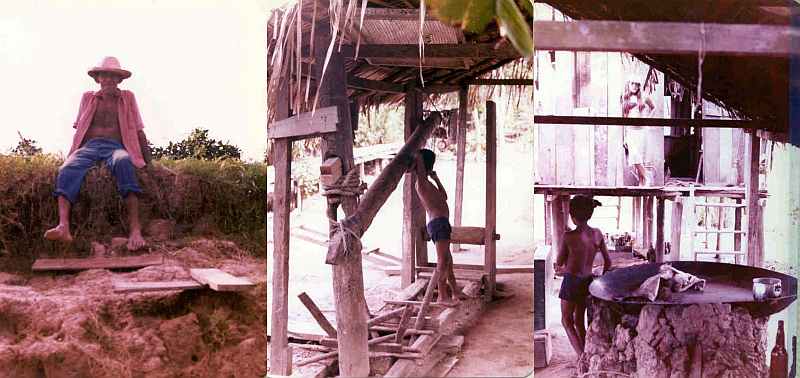
Manioc mill in Amazonas settlement





